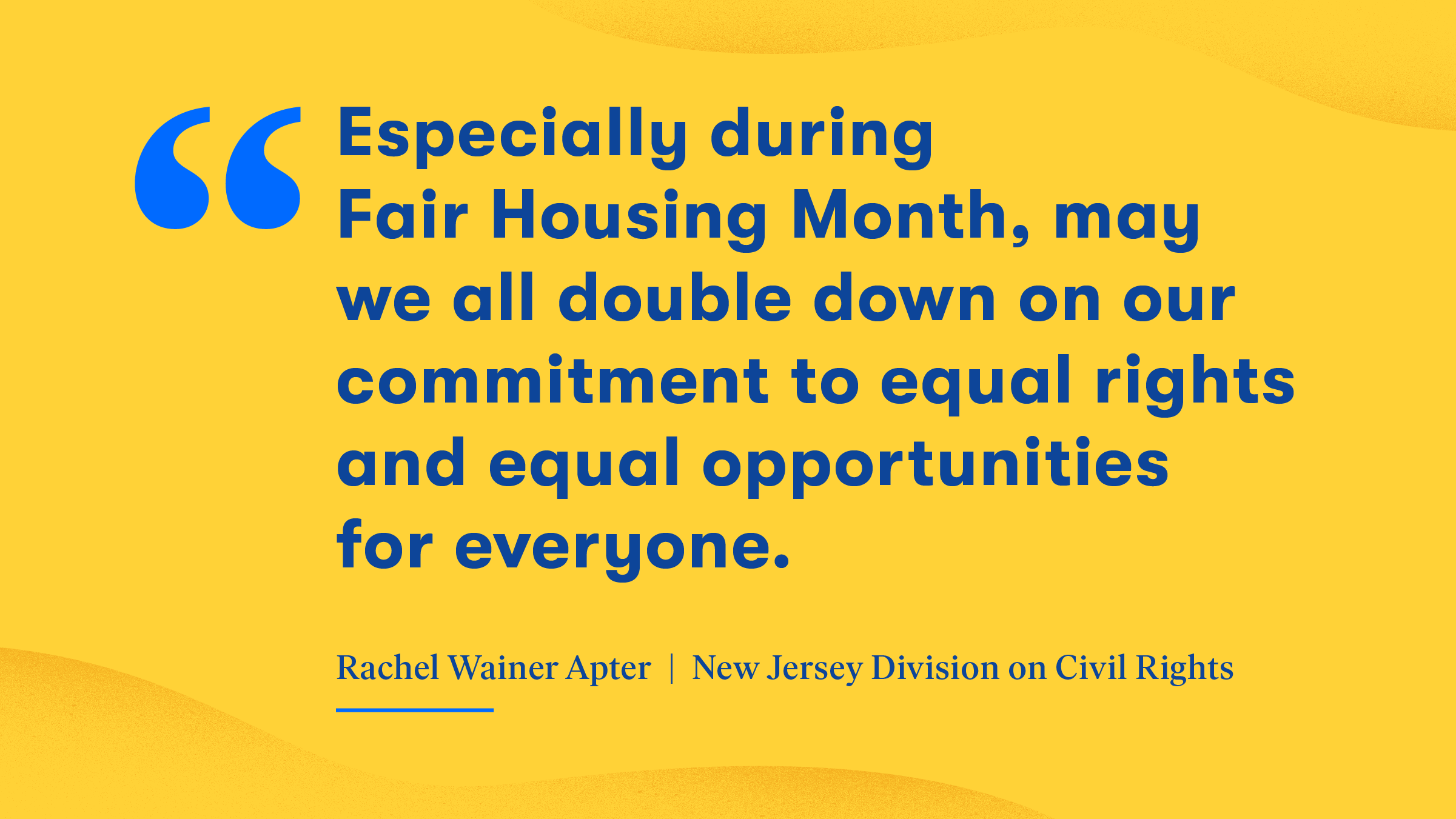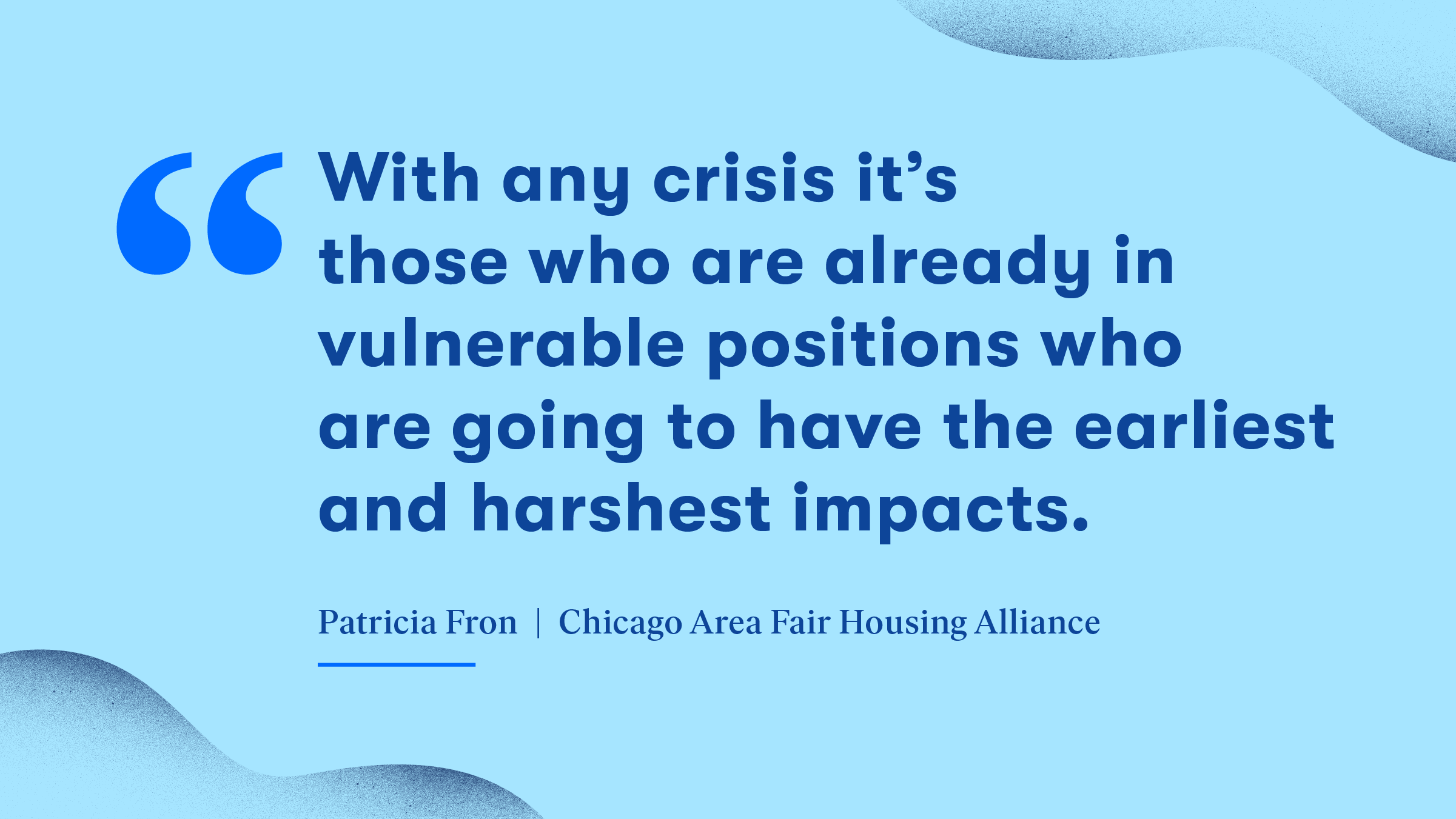Housing is a stabilizer that links people to other life opportunities like employment, healthcare and education. For National Fair Housing Month, we interviewed two fair housing experts to understand how the pandemic is affecting the fair housing environment in our country.

Rachel Wainer Apter is the director of the New Jersey Division on Civil Rights. She and her team are charged with preventing and eliminating discrimination in New Jersey, whose Law Against Discrimination (LAD) was the first state-level civil rights law in the nation to go into effect. The LAD prohibits discrimination and bias-based harassment in employment, housing and places of public accommodation.

Patricia Fron is co-executive director of the Chicago Area Fair Housing Alliance (CAFHA). CAFHA is a leading voice for fair housing in the Chicago region, mobilizing over 45 non-profit and government partners to advocate for strengthened fair housing protections and promote equitable community development.
The federal Fair Housing Act prohibits discrimination based on race, color, national origin, family status, religion, sex and disability. Many state and local laws also protect other classes, such as sexual orientation, gender identity and source of lawful income.
This interview has been edited for brevity and clarity.
What has changed in terms of fair housing as it relates to the new coronavirus? Which groups are the most vulnerable?
RACHEL WAINER APTER: While in many ways the pandemic has inspired countless acts of selflessness and courage, it has also exposed the systemic inequalities that continue to plague us. Around the country, as well as in New Jersey, staying at home is extremely difficult for people who are homeless or who lack stable housing. Low-wage workers are less likely to be able to work from home and more likely to be exposed to the virus as retail grocery workers, public transit employees, and health-care workers and custodial staff. And in part due to existing health disparities, black and Hispanic people are more likely to die from COVID-19 than white people.
In terms of reports of discrimination, this is a situation that’s constantly changing and evolving. Originally, we’d heard about discrimination and harassment against people of Asian descent based on false claims that they “caused” COVID-19 or were responsible for spreading the new coronavirus. There have been more recent reports of the same against people who appear to be Italian or Jewish. And now that so many people in New Jersey have been exposed to the virus, we’re also hearing of discrimination against people who have or are perceived to have COVID-19.
PATRICIA FRON: With any crisis it’s those who are already in vulnerable positions who are going to have the earliest impacts and the harshest impacts. Here in Cook County (Chicago), race and poverty are very interconnected, putting black and Latinx populations in financially vulnerable positions, and I think that’s true across the country, so you’re going to see disparities based on race and also disparities based on disability and source of income. You’re certainly going to see disproportionate impacts.

Which fair housing protections under fair housing law do renters and landlords need to be aware of as it relates to the new COVID-19?
WAINER APTER: Under the NJ Law Against Discrimination (LAD), which we at the Division on Civil Rights enforce, a disability is defined broadly and would include someone who is ill from COVID-19. The LAD also prohibits discrimination against anyone who is perceived to have a disability, including COVID-19. So it would be illegal under the LAD for a landlord to ask a tenant to move out because they have COVID-19 or because the landlord believes they have COVID 19. In addition, a landlord or building manager could not refuse to make necessary repairs to an apartment based on a suspicion that a tenant had COVID-19 because she is Asian. The LAD does not prohibit a landlord from taking reasonable steps to protect the landlord or other tenants from COVID-19. But those steps cannot be based on stereotypes or actual or perceived race, national origin or disability. With the economic hardships associated with COVID-19, there may also be more people relying on temporary rental assistance to pay rent. In New Jersey, those individuals cannot be evicted or otherwise discriminated against because of the source of income that they are using to make rental payments.
Eviction moratoriums have been issued in some cities and states. There are probably landlords who say in the short term they can wait on evictions a little while, but they’re running a business. What do you say to them?
FRON: First, a lot of people don’t know what exactly an eviction moratorium means. Your rent won’t be forgiven during this time, it’s really just a pause, a band aid.
If you’re a landlord and you have it in your means to give your renters a break please, please do so — we are all in this together. If you’re a landlord and you don’t have the funds to give your renters a break, and a lot of people don’t, consider joining the fight for relief with one voice. I think it’s important to organize renters and landlords together.
Everyone who’s struggling month to month to get by needs to be united to show that we need comprehensive relief, we need rent and mortgage assistance or forgiveness to stabilize households. We need to see the ways we’re connected as landlords and renters, because stability for renters means stability for landlords and vice versa.

What can we learn from other national crises in terms of fair housing protections that we can act on to reduce violations now?
FRON: If we can learn any lessons from the past, like the recession in 2008 for example, is that the most vulnerable individuals face the steepest consequences. I worked in housing, more direct services, at the time of the recession, and we saw an increase in sexual harassment cases. Landlords who knew that households, predominantly women-headed households, could not pay their rent would proposition the women with quid pro quo type arrangements. The problem is that people didn’t know their rights.
I think we can learn lessons from past crises and get ahead of that to make sure that people are supported, that they know what their rights are, that they know where to turn for help.
What’s the possibility that COVID-19 can be a springboard for good when it comes to fair housing?
WAINER APTER: I’m hopeful that COVID-19 — because it can impact all people regardless of race, national origin, religion, disability, sexual orientation or gender identity or expression — will remind all of us that we are part of one human family and we are all entitled to equal dignity and equal respect.
That’s what really Fair Housing laws at root are all about, treating people as individuals, not based on stereotypes or fear. Especially during Fair Housing Month, may we all double down on our commitment to equal rights and equal opportunities for everyone.
Where to learn more
While federal fair housing protections are consistent across the country, many states, cities and counties provide additional fair housing protections. Contact your state attorney general or your local fair housing center if you believe you have been the victim of housing discrimination or want to learn more about local fair housing laws.
In New Jersey, the Division on Civil Rights has detailed information about protections specific to COVID-19, including frequently asked questions. You can file a housing discrimination complaint via a statewide hotline: 866-405-3050.
In the Chicago-area, Cook County government has a COVID Resource and Response page. The Illinois attorney general office has housing guidance for landlords, renters and homeowners.